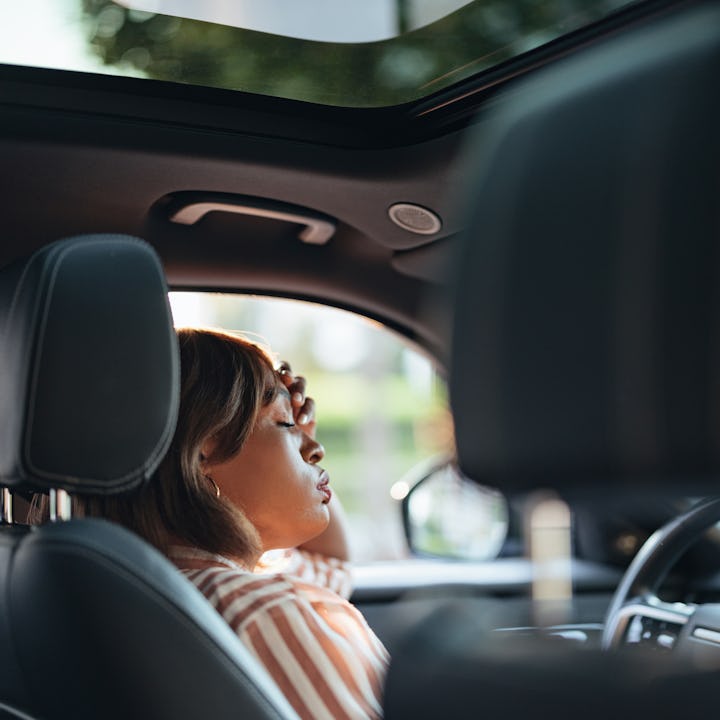Why Do So Many Moms Cry In Their Cars? Don’t Worry, Therapists Approve Of Our Vehicular Sob Sessions
If not the car, then where?

We've all done it: pulled into the driveway and not gotten out of the car. Your boss chewed your ass for something at work that wasn't even your fault, and you know you're about to walk into the absolute chaos of kids and dinner and homework and bedtimes. So you cry. Why is it that so many moms cry in the car, though? It can't just be the timing. What is it about sitting in the front seat, car in park, that just begs us to break down for a second? Listen, if staring at the wall can count as meditation, why can't a good steering wheel sob sesh count as therapy?
I polled around a dozen mental health experts, and they all agreed that moms crying in the car is completely normal. So, you're definitely not alone. But why do we all do it?
"Moms may feel safe to cry in the car because it's one of the few times and places we may actually be alone and fully free from the demands and expectations of other people, whether that's kids, partners, coworkers, or even just strangers on the street," says Dr. Rachel Proujansky, a clinical psychologist based in New York City. She's also a new mom, so she gets it. "This breathing room likely gives us the time and space to check in with how we're feeling, and sometimes it turns out we're feeling pretty sad or overwhelmed."
Adds Dr. Katie Carhart, "As a clinical psychologist and a mom of two, I think we often don't feel comfortable falling apart at home, because we don't want our kids to worry or absorb our emotions. The car tends to be a place where we can conveniently grab a few minutes of privacy to let out all the things we've been holding in. So not only are we juggling the mental load, and often absorbing the emotions of the household, but we also work to not put that burden back on our family,"
You also might tear up in the car because you’re usually in some sort of transition period while at the wheel, says Audrey Schoen, a licensed marriage and family therapist and mother herself.
“School or daycare dropoff or leaving home or work to pick up — transitions can be challenging, either because the kids are deregulated, or because it brings up feelings about how we wish things could be or feel versus how they really are,” she says. There are also no distractions to turn to. You kind of just have to feel it all. “It’s one of the few moments where we are forced to be still. And we are alone. No screens, no kids, no chores to distract us. It’s in those still moments that all the stress and emotions flood in.”
Is crying in the car normal or a sign of something more serious?
If you’re a routine car crier, there’s nothing wrong with that. It’s good to notice how we’re feeling and why, Proujansky says — it gives us important information about what is or isn’t working well in our lives, which allows us to then do something about it. We also shouldn’t think that being perfectly happy and content is what’s normal, especially in a society that routinely leaves mothers behind.
“The other important piece of this, though, as far as ‘normal’ goes, is to wonder how much of this is a product of our society and how it treats women — mothers in particular,” she adds. “While mothers may be having totally normal responses to chronic stressors, at a certain point we have to check in on the social structures that leave so many moms crying in their cars. The way mothers are expected to shoulder so many financial, logistical, and caregiving responsibilities, I would argue, is not normal.”
When is crying in the car...too much crying in the car?
Look, some people are just more prone to tears than others. You know yourself and what your normal is. If you find that you’re crying more often than not in the car, it could signal that you need more time and space for yourself to suss out feelings and get support, Proujansky explains.
It matters that you do this because, Carhart says, “research shows that moms’ well-being impacts their children’s well-being and the family dynamic as a whole.” She recommends building out your support network, finding ways to share the mental load with your partner, and carving out consistent, recurring time for yourself. It could be 15 minutes of reading before bed, she says, a non-negotiable solo walk you take every weekend, or a new creative activity you do to replace doom scrolling.
All three experts agree that if you notice other signs of depression in yourself, you should seek professional help to get you feeling more like yourself again ASAP. According to the Cleveland Clinic, some of the most common symptoms include:
- Feeling abnormally sad or hopeless.
- Not enjoying things that used to bring you joy.
- Changes in your appetite or ability to sleep well.
- Having difficulty concentrating.
- Fatigue or low energy.
“I would worry if the crying was most of the day nearly every day, was accompanied by anxiety, extreme fatigue, or intense guilt, or happened along with self-injury or suicidal ideation,” Proujansky says.
But hey, if you’re just having a day and need to let the tears flow before you open that driver’s side door... you do you, boo boo. Get it out in peace. Those kids will still be causing a ruckus when you go inside five minutes from now.